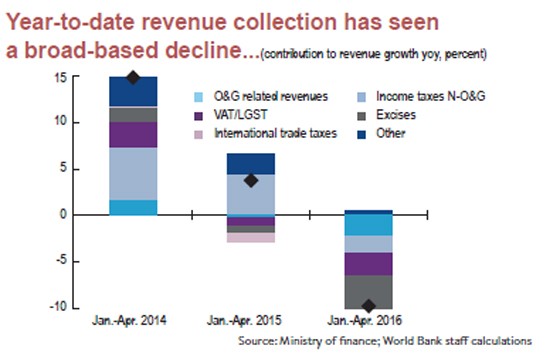Popular Reads
Top Results
Can't find what you're looking for?
View all search resultsPopular Reads
Top Results
Can't find what you're looking for?
View all search resultsRI could see wider budget deficit: WB
Change text size
Gift Premium Articles
to Anyone
T
he government should prepare for a bigger state budget deficit if it is to realize its capital spending to stoke growth amid looming risk of lower revenues and an uncertain future regarding the government’s planned tax amnesty, the World Bank has said.
The international agency said that government expenditure was projected to increase in the next three quarters in line with historical trends and calculations showing that at least Rp 183 trillion (US$14 billion) or 90 percent of total government capital expenditure of Rp 202 trillion, which is mainly used to fund infrastructure projects and has been stated in the 2016 state budget, could be achieved by this year-end.
The World Bank report shows that total expenditure increased by 9.2 percent as of April from the same period last year (yoy), supported by strong growth in material (66 percent yoy) and capital spending (106 percent yoy). Disbursement increased by 89 percent for material and by 39 percent for capital relative to the average of the past five years. The improvement is likely the result of early procurement decisions made by the Public Works and Public Housing Ministry.
High public spending on investment is the key factor in Indonesia’s resilience and marks it out among its peers amid private investment conditions that have yet to recover, World Bank lead economist for Indonesia Ndiame Diop said during the launching of the World Bank’s Indonesia Economic Quarterly June 2016 edition at the Trade Ministry in Central Jakarta on Monday.
The report however also recorded a 9.8 percent broad-based decline in revenue collection between January and April.
The World Bank estimates that state revenues will reach only Rp 1.51 quadrillion, slightly lower than the Rp 1.55 quadrillion projected in March. The projection does not take into account potential revenues from the tax amnesty, which remains in limbo.
To partly compensate for lower revenues, the government can expand the fiscal deficit within the rule of 3 percent of gross domestic products (GDP) and reduce non-priority expenditure to prioritize public investment and maintain growth.
The World Bank also projects a fiscal deficit of 2.8 percent, far higher than the government target in the revised 2016 budget draft of 2.48 percent.
“Indonesia will still be able to maintain its public investment even if the tax amnesty produces nothing,” Diop said.
The government is depending on the tax amnesty bill currently being deliberated at the House of Representatives to cushion the tax revenue shortfall this year, including Rp 165 trillion expected from the amnesty in its tax collection target of Rp 1.36 quadrillion, a figure deemed by economists as too risky.
Diop said Indonesia would continue to face limited fiscal space as a domestic risk alongside weak credit growth and frozen state-owned enterprise capital injections (PMN).
“If PMN and the tax amnesty are approved, those risks can be mitigated domestically,” he said.
External risks and uncertainties, which include monetary policy in the US, the UK’s EU membership referendum, China rebalancing and trajectories of commodity prices and global growth, could also affect Southeast Asia’s largest economy, Diop warned.
He also said that it would take a while for President Joko “Jokowi” Widodo’s reform measures to bear fruit and help ease the government’s burden.
“Reform through policy packages will take time to be effective. We need more measures in the meantime,” Diop said, referring to the government’s 12 economic policy packages issued since September last year.
Trade Minister Thomas Lembong maintained that the government would continue on the path of reform.
“We are only 3 to 5 percent along the planned reforms that we’d like to pursue,” he said, “It’s a massive adjustment for bureaucracy, business and beyond.”










